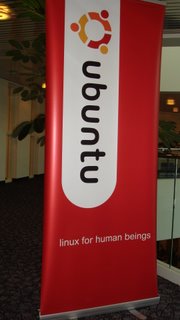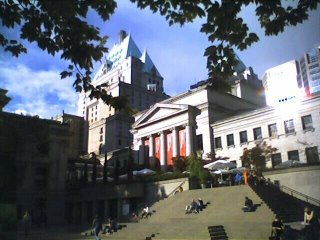
The famed "approach road" from the rear glass of my car, as I left Vizag yet again on Dec 12, 2006. Probably one or two more trips home, and then township will no longer be home!
 I got the chance to volunteer at the ubuntu developers' summit today. It was pretty cool seeing all these guys discuss the future directions of probably the fastest growing linux platform in the recent past. Mark Shuttleworth even gave a talk yesterday, which I am sorry I missed. But looks like it was video taped and I am hoping to lay my hands on it soon.
I got the chance to volunteer at the ubuntu developers' summit today. It was pretty cool seeing all these guys discuss the future directions of probably the fastest growing linux platform in the recent past. Mark Shuttleworth even gave a talk yesterday, which I am sorry I missed. But looks like it was video taped and I am hoping to lay my hands on it soon.


 [Looking east on 168th and Pacific (10/22/2006 3:04pm)]
[Looking east on 168th and Pacific (10/22/2006 3:04pm)]My hope is that whatever you do to make a good life for yourself -- whether you become a teacher, or social worker, or business person, or lawyer, or poet, or scientist -- you will devote part of your life to making this a better world for your children, for all children. My hope is that your generation will demand an end to war, that your generation will do something that has not yet been done in history and wipe out the national boundaries that separate us from other human beings on this earth.
Recently I saw a photo on the front page of the New York Times, which I cannot get out of my mind. It showed ordinary Americans sitting on chairs on the southern border of Arizona, facing Mexico. They were holding guns and they were looking for Mexicans who might be trying to cross the border into the United States. This was horrifying to me -- the realization that in this twenty-first century of what we call civilization we have carved up what we claim is one world into two hundred artificially created entities we call "nations" and are ready to kill anyone who crosses a boundary.
Is not nationalism -- that devotion to a flag, an anthem, a boundary so fierce it leads to murder -- one of the greatest evils of our time, along with racism, along with religious hatred? ....
... My hope is that you will not be content just to be successful in the way that our society measures success; that you will not obey the rules when the rules are unjust; that you will act out the courage that I know is in you. ...
Another of my students at Spelman, Alice Walker, .... wrote in one of her first published poems:It is true --I am not suggesting that you go that far, but you can help to break down barriers, of race certainly but also of nationalism; that you do what you can -- you don't have to do something heroic, just something, to join the millions of others who will just do something because all of those somethings, at certain points in history, come together and make the world better.
I've always loved
the daring
ones
Like the black young
man
Who tried
to crash
All barriers
at once,
wanted to
swim
At a white
beach (in Alabama)
Nude.
That marvelous African American writer Zora Neale Hurston, who wouldn't do what white people wanted her to do, who wouldn't;t do what black people wanted her to do, who insisted on being herself, said that her mother advised her: Leap for the sun -- you may not reach it, but at least you will get off the ground.
By being here today, you are already standing on your toes, ready to leap. My hope for you is a good life.
-- Howard Zinn.
 cteristic was that one moment, you are in a thriving business district, the next, in a rundown alley, and then again back into the hustle, all within a few blocks. I actually dared to mark the transitions by retracing my steps for a few blocks, but somehow never figured exactly where they occurred. I should say though that even the roughest parts of the town weren't all that bad; most people seemed to mind their own business and for the most part I think I was invisible. I think I walked close to 15-20 miles in the 3 evenings that I was there -- it may not sound like much to a seasoned traveller, but it was enough for me to start appreciating a bicycle.
cteristic was that one moment, you are in a thriving business district, the next, in a rundown alley, and then again back into the hustle, all within a few blocks. I actually dared to mark the transitions by retracing my steps for a few blocks, but somehow never figured exactly where they occurred. I should say though that even the roughest parts of the town weren't all that bad; most people seemed to mind their own business and for the most part I think I was invisible. I think I walked close to 15-20 miles in the 3 evenings that I was there -- it may not sound like much to a seasoned traveller, but it was enough for me to start appreciating a bicycle. The other thing that I found interesting was ofcourse the nightlife. To be fair, I expected a city like Vancouver to have a respectable amount of activity, but even then I was unprepared for what I saw. I had to catch a flight out early in the morning, so I dozed off at midnight and woke up dizzy and hazy at 3 a.m. To my surprise, the street was as lively as it was during mid afternoon. There were a whole bunch of people milling around, although I suspect most of them didn't know that, and the metro buses were actively ferrying people to and away from downtown. It was surely a world away for someone like me who has until recently called quaint little Omaha, Neb home.
The other thing that I found interesting was ofcourse the nightlife. To be fair, I expected a city like Vancouver to have a respectable amount of activity, but even then I was unprepared for what I saw. I had to catch a flight out early in the morning, so I dozed off at midnight and woke up dizzy and hazy at 3 a.m. To my surprise, the street was as lively as it was during mid afternoon. There were a whole bunch of people milling around, although I suspect most of them didn't know that, and the metro buses were actively ferrying people to and away from downtown. It was surely a world away for someone like me who has until recently called quaint little Omaha, Neb home. Walking in the business district during the daytime was a pleasure. It was very New York like, but a lot more cleaner and cozier. The imposing Museum of Art seemed to be a favorite hang out place. They were in fact unloading a huge mural of sorts when I was walking past, almost the length of an 18 wheeler, and I was surprised to find security personnel in dark suites and ear plugs watching everyone go by -- in fact, I had to make an about turn soon after I crossed the area and sure enough, got an long look from one of the security people who looked very much like the sour old lady who screams a lot in "Austin Powers: The Spy..." movie.
Walking in the business district during the daytime was a pleasure. It was very New York like, but a lot more cleaner and cozier. The imposing Museum of Art seemed to be a favorite hang out place. They were in fact unloading a huge mural of sorts when I was walking past, almost the length of an 18 wheeler, and I was surprised to find security personnel in dark suites and ear plugs watching everyone go by -- in fact, I had to make an about turn soon after I crossed the area and sure enough, got an long look from one of the security people who looked very much like the sour old lady who screams a lot in "Austin Powers: The Spy..." movie.